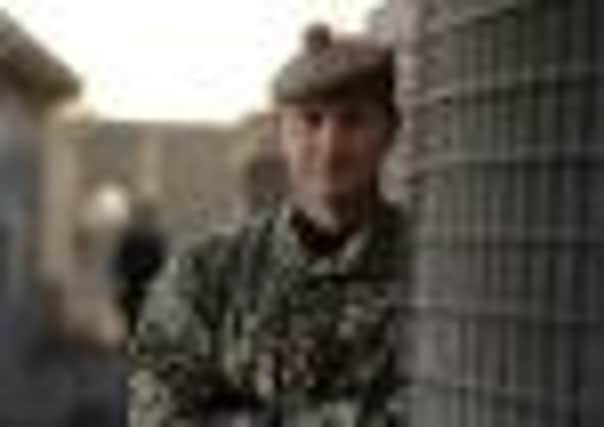50 Scots soldiers in Afghanistan to be home by New Year


The soldiers will come from The Scots Guards Battle Group in Helmand, as part of a phased withdrawal of 500 soldiers.
Many of the men coming home are currently stationed around Forward Operating Base Ouellette, in the Upper Gereshk Valley.
Advertisement
Hide AdAdvertisement
Hide AdThe Ministry of Defence has been determined to steadily reduce numbers of soldiers deployed in the Afghan conflict.
By the end of 2014, the UK aims to have only a small presence there, backing the 350,000-strong Afghan National Security Force that is taking over all security responsibility.
Sceptics doubt that Afghan National Army, backed by local and national police, will have the strength and resources to keep the Taleban at bay.
But last night the top British military leader in Helmand pledged that 500 British troops across the board will be withdrawn by the end of 2012 – to be followed with further reductions in deployment.
Brigadier Bob Bruce, Commander of Task Force Helmand, said: “I trained a force to come over here and 500 of that force will be at home on the 31st of December. That is absolutely on track. It will be in ones and twos rather than one lot of 500. They will be coming from across the board. Some of them know already, some of them are back already. Around half of them.”
Cpl Stewart Ducie, 20, from Cambuslang, Glasgow, said: “I think we have made a difference here, but we are all now looking forward to going home.
“The Afghan Police here have proved on more than one occasion that they are ready to take over the checkpoint and provide security for the locals.”
Guardsman Aaron Boyd, 20, of Beith, Ayrshire, is among a group of Scots to be sent home early from the Pan Kalay checkpoint ten miles from FOB Ouellette. He said: “It has been really good fun here in Pan Kalay. It is a shame we have to go home as it has been great working with the ANCOP [Afghan National Civil Order Police]. The ANCOP here are superb. They will definitely keep the Taleban at bay and keep the locals safe.”
Advertisement
Hide AdAdvertisement
Hide AdThe brigadier said this tour –Herrick 17 – would be known as the time when the UK changed its tack on the deployment.
He added: “I have been saying for nearly two and a half years that this tour would be characterised by change. I knew this tour would involve some redeployment.
“I wrote in the welfare booklet that we sent out to families that not everybody who deploys would do the full six months.
“I explained that it wasn’t clear at the time of writing that it wasn’t clear who wouldn’t do the full term. We just needed people to be flexible about that.”
Brigadier Bruce, from Dunfermline, paid tribute to the Scots soldiers under his command.
He said: “I have been part of the Scottish infantry my whole career – since 1987 – and I’ve been hugely proud to have been firstly in the Royal Scots and then the Royal Regiment of Scotland.
“I have done numerous operational tours, almost all of them with Jocks, and time and time again their professionalism and raw courage are absolutely incredible. For me, as a commander, to have Scottish soldiers in the brigade, is as much of a boon tactically as it is an honour.
“1 Scots is the battalion I had the honour to command, so to have then back in the brigade is an honour.”
Advertisement
Hide AdAdvertisement
Hide AdBruce refused to speculate on how many British troops from the 9,500 currently deployed might still be in Afghanistan after the December 2014 withdrawal deadline.
He emphasised his view that the Taleban threat could be contained by the ANSF.
He added: “I’m not saying it’s not a dangerous situation, but I’m saying that our capability overmatches theirs in every situation.
“The Afghan National Security Forces are able to overmatch them at every turn. Tactically, it’s something the Afghans can deal with.”